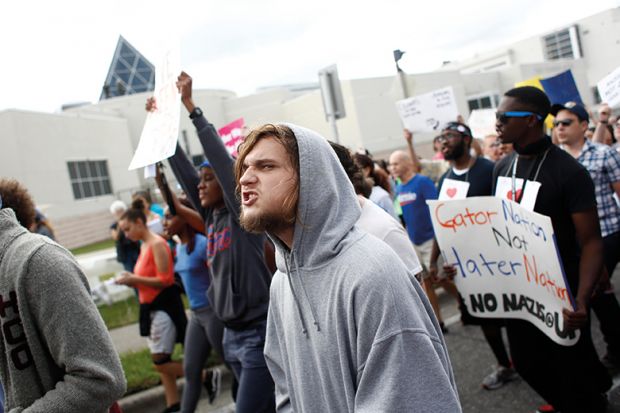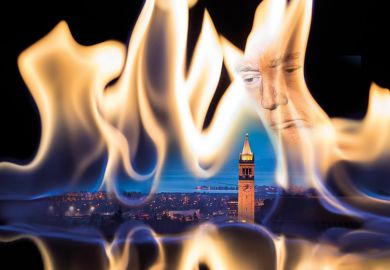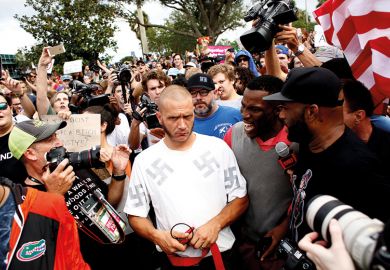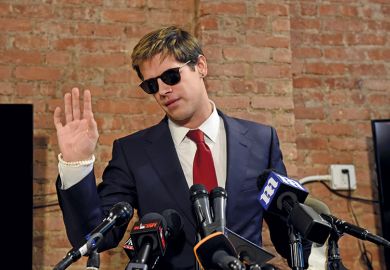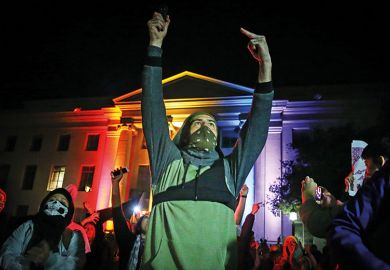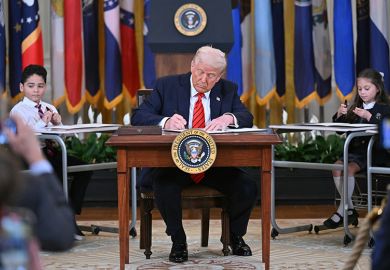The alligators in Lake Alice, on the University of Florida’s huge campus, stayed hidden beneath the water’s surface on a hot June day. Footage from a couple of years back of an alligator interrupting a lakeside student picnic to snatch a sandwich shows that it is wise to heed the warning signs and “stay away from the water”. As a storm flashed by in the distance, the most alarming presences on the university’s campus in Gainesville were the legions of persistent mosquitoes.
Things were far less serene on 19 October last year, when Richard Spencer – the most prominent white supremacist in the US and populariser of the term “alt-right” – spoke at the university. Florida governor Rick Scott declared a statewide state of emergency, 1,000 police officers were on campus – including snipers on rooftops – while helicopters and drones circled overhead, and thousands of protesters gathered outside and inside the auditorium where Mr Spencer spoke.
The share of the security costs borne by the public university came to more than $300,000 (£226,000), while Mr Spencer’s bill was limited to the $10,000 that he was charged for auditorium hire (federal law prevents external speakers being billed for security costs).
At the University of Florida, scene of one of the most explosive controversies over free speech on campus, key questions are still being debated: how universities can stop themselves being “exploited” by extremist speakers, and whether there are, or should be, limits to free speech at universities when it comes to the expression of racist views.
Kent Fuchs, the university’s president, told Times Higher Education that “nationwide and worldwide there are controversial people that come to universities – and…universities do have a role, I think, to be a place where ideas are aired and debated and discussed. But the real issue is what about ultra, cruelly, extraordinarily extremist individuals. Are universities a place where those people can come and have a platform?”
The key factors that allowed Mr Spencer to speak at the University of Florida (he was not invited by any individual or student group at the university) are common to other episodes in the US involving extremist or “controversial” speakers on campus, notably Milo Yiannopoulos’ appearances at the public University of California, Berkeley.
The First Amendment to the US Constitution prevents laws abridging the right to free speech (with exceptions for certain specified categories of speech). As a public university, the University of Florida has obligations under the First Amendment and in terms of public use of its facilities. Given these factors, the University of Florida leadership eventually opted (after a couple of about-turns) to allow Mr Spencer to speak rather than fight him in the courts. But some students and faculty strongly believe that the latter option would have been the right one.
Mr Spencer and his National Policy Institute thinktank sued other universities that refused permission for him to speak at their campuses, with one, Michigan State University, eventually allowing him to appear in March.
The “delay strategy” of refusing permission “worked for many of [the universities] because he’s given up” by dropping other lawsuits, said Dr Fuchs.
However, he added: “At our point in time, we believed that they [Mr Spencer and the National Policy Institute] were well funded. And we brought in constitutional experts that had argued Supreme Court cases, [and we] had them helping us determine the path forward. They all said, ‘you cannot stop him forever. What you can do is control the place and the time.’ So that’s what we decided to do.”
Dr Fuchs continued: “I received personally two primary criticisms. One was, indeed, that we did not fight through until the Supreme Court in not allowing him to come. And then, secondly, that I was so vocal in telling everyone not to be present near the event.”
In a statement at the time, Dr Fuchs made clear the University of Florida’s “denunciation of all hate speech and racism, and in particular the racist speech and white-nationalist values of Mr Spencer”. But given “what Spencer wanted was for people to show up and yell at him”, Dr Fuchs told students that the best option was for them to “protest…somewhere else so there’s not the media story”, he said.
Apprehension was high given events at the University of Virginia in Charlottesville in August 2017, where Mr Spencer led a torch-lit rally of white supremacists and a counter-protester was killed.
The BBC reported from the University of Florida that “inside the campus auditorium several dozen supporters of Mr Spencer were overwhelmingly outnumbered by protesters who shouted down the speaker” with chants of “Nazis are not welcome here” and “Let’s Go Gators!” – a reference to the university’s sports mascot.
Clay Calvert, Brechner eminent scholar of mass communication and director of the Marion B. Brechner First Amendment Project at the University of Florida, said that Mr Spencer “definitely raises huge First Amendment-based free speech questions for public universities in the United States”.
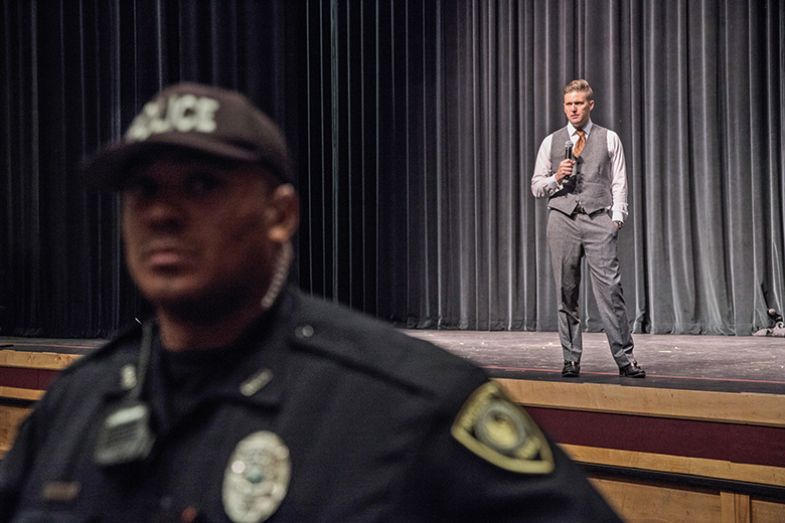
Richard Spencer on stage
“Hate speech” and speech that is merely offensive “generally is protected by the First Amendment”, said Professor Calvert. Key exceptions to speech protected by the First Amendment includes speech likely to incite others to violence. But Mr Spencer is “very savvy” and “never comes close to crossing that incitement to violence line”, said Professor Calvert.
Dr Fuchs said: “Hate speech really is a protected speech in the United States…I’m ambivalent about that because I’ve seen the difficulty it’s caused for us.”
For Professor Calvert, there is a bigger picture on universities and free speech behind events at the University of Florida.
“I think at public university campuses today, we may be at an inflection point where assumptions that the First Amendment is a good thing are not necessarily held by a majority of students or faculty; that free speech today is seen more as a weapon than it is as a tool of a democratic society,” he said. “That’s particularly disturbing from a traditional perspective because a university is supposed to be a marketplace of ideas, where you can debate any topic or idea. If you can’t do it at a public university, where can you do it?”
Asked why campus free speech is such an issue now, Professor Calvert highlighted the political polarisation of the “Trumpian era”. He added that “Trump fanned the flames of this when he did not come out early after Charlottesville, Virginia, and condemn the white nationalists” (the US president notoriously said that there were “some very fine people on both sides” in Charlottesville). Mr Trump’s stance “feeds this desire [among some students] – ‘if the president isn’t going to condemn it, we’ve got to censor this speech somehow’”.
Professor Calvert also argued that anti-bullying campaigns in public schools, while having commendable aims, sent school students (now in college) a message “that speech that offends someone else is not protected; that everybody has to be nice to everybody; that everybody has to tolerate everybody”.
But for Paul Ortiz, associate professor in history and vice-president of the United Faculty of Florida’s University of Florida union chapter, the Spencer episode was “not about the First Amendment”.
Mr Spencer’s argument for the advancement of “ethnic cleansing” in the US is not just a political debate along the lines of whether someone backs the Republicans or Democrats, Professor Ortiz said. Arguments for ethnic cleansing have a “certain special meaning in the history of Western civilisation”, he added.
In an essay published in the National Education Association journal Thought and Action, Susan Hegeman, a University of Florida English professor, and Professor Ortiz write that “instead of standing up to Spencer and paying for a legal battle, the university chose to turn part of campus into a militarised zone” at huge expense.
As to why Mr Spencer wanted to speak at the University of Florida, Professor Fuchs argued that he and his followers have little interest in universities, except as a platform. “These individuals have become very sophisticated at using social media and the press to create an audience and to get their persona in the worldwide media,” he said.
However, Professors Hegeman and Ortiz believe that Mr Spencer’s “cynical invocation of free speech rights is part of a larger far-right assault on higher education” – and that Florida was an attractive destination given the state’s “long history of white supremacy, Jim Crow [segregation laws], and racist violence”.
What lessons can other universities draw from the University of Florida about how to best respond to the broad issue of extremist speakers on campus?
Professors Hegeman and Ortiz argue that the most important thing to take away from the Spencer episode is the way faculty union members, students and community activists came together to show a united front against racism and white supremacism, which they believe deterred Spencer followers from showing up in the numbers that they did in Charlottesville. They point to “weeks of coalition building, anti-racist education, and movement organising that ensured Gainesville would not be a repeat of Charlottesville”.
Professor Calvert has written in an essay for the First Amendment Law Review that while “the collapse of conversations on public university campuses and the rise of attitudes in favor of stifling speakers are profoundly troubling developments”, it is “equally worrisome that educational institutions are being exploited and held financially hostage in the name of the First Amendment by extremist speakers”.
Professor Calvert told THE that the long-term solution could be the design of “content neutral policies” – ones not taking into account the views of the speaker – “that shift the [security] fees, some proportion of the fees” on to those who want to appear on campus.
Professor Fuchs argued in a Wall Street Journal article that as the federal government requires universities to follow the First Amendment, there should be a federal fund to assist universities with the security costs brought by extremist speakers.
Universities are “being used and exploited and it’s because of this federal law that won’t let us charge [extremist speakers for their security fees], won’t let us stop them and we have to bear the cost somehow,” Professor Fuchs told THE. “There needs to be, I think, some public support for that, if it [the targeting of universities by extremist speakers] were to continue.”
POSTSCRIPT:
Print headline: ‘Free speech now is more a weapon than a tool of democracy’
Register to continue
Why register?
- Registration is free and only takes a moment
- Once registered, you can read 3 articles a month
- Sign up for our newsletter
Subscribe
Or subscribe for unlimited access to:
- Unlimited access to news, views, insights & reviews
- Digital editions
- Digital access to THE’s university and college rankings analysis
Already registered or a current subscriber?
